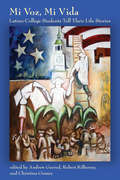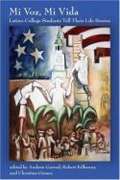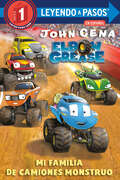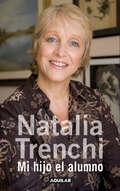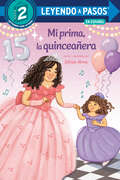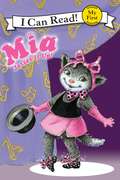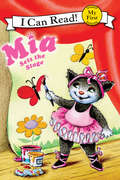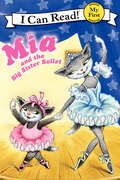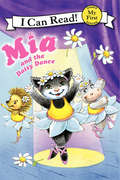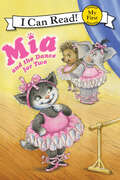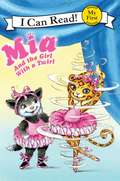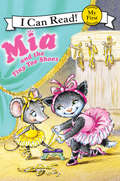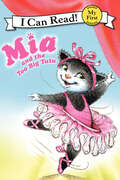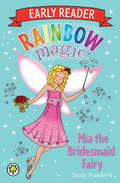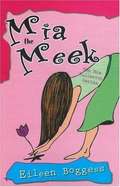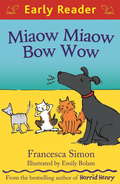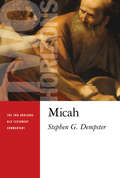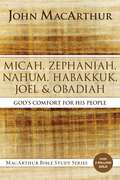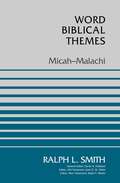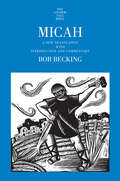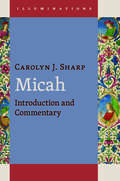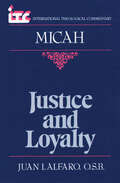- Table View
- List View
Mi Voz, Mi Vida
by Andrew Garrod Robert Kilkenny Christina GómezAmid the flurry of debates about immigration, poverty, and education in the United States, the stories in Mi Voz, Mi Vida allow us to reflect on how young people who might be most affected by the results of these debates actually navigate through American society. The fifteen Latino college students who tell their stories in this book come from a variety of socioeconomic, regional, and family backgrounds-they are young men and women of Mexican, Puerto Rican, Cuban, Dominican, Central American, and South American descent. Their insights are both balanced and frank, blending personal, anecdotal, political, and cultural viewpoints. Their engaging stories detail the students' personal struggles with issues such as identity and biculturalism, family dynamics, religion, poverty, stereotypes, and the value of education. Throughout, they provide insights into issues of racial identity in contemporary America among a minority population that is very much in the news. This book gives educators, students, and their families a clear view of the experience of Latino students adapting to a challenging educational environment and a cultural context-Dartmouth College-often very different from their childhood ones.
Mi Voz, Mi Vida: Latino College Students Tell Their Life Stories
by Andrew Garrod Robert Kilkenny Christina GomezGarrod (education, Dartmouth College), Kilkenny (social work, Simmons College, Boston), and Goméz (sociology and Latino studies, Northeastern Illinois U. , Chicago) present a collection of 15 first-person narratives by Latino college students, aged 18 to 22, who attended Dartmouth; all but one of the essays was written within the last four years. The authors reflect on formative relationships and influences, life-changing events, and factors that helped shape their values, educational outcomes, and sense of personal identity. The text does not focus on Dartmouth per se or on its educational impact on the students, but rather on their evolving lives and Latino identities. The contributions are grouped into four major themes from the essays-- resilience, biculturalism, mentoring, and identity. For educators, college administrators, students and their families.
Mi familia de camiones monstruo (LEYENDO A PASOS (Step into Reading))
by John CenaConoce a Elbow Grease . . . ¡ahora en español! Sigue al pequeño camión que nunca se rinde y a sus cuatro hermanos en este libro infantil escrito por el exitoso autor y superestrella John Cena.¡Un divertido y dinámico libro nivelado de la talentosa celebridad John Cena! Elbow Grease tiene cuatro hermanos, cada uno es especial y único a su manera. Conoce al gran Tanque, al veloz Flash, al súper listo Pinball, al bravo Crash y, por supuesto, a Elbow Grease, quien nunca se rinde. Este libro nivelado Paso 1 está basado en la serie ilustrada Elbow Grease de John Cena.LEYENDO A PASOS es una línea de Step into Reading que ofrece ediciones en español de libros nivelados. Los libros Paso 1 tienen letra grande y palabras fáciles. Son ideales para niños que conocen el abecedario y que quieren comenzar a leer. Su ritmo, rima y pistas visuales contribuyen a la comprensión del texto.Meet Elbow Grease, now in Spanish! Follow the little truck who never gives up and his four monster truck brothers in this Spanish edition of the Step 1 reader--from superstar entertainer and #1 New York Times bestselling author John Cena!A fun and fast-paced leveled reader from multitalented mega celebrity John Cena! Elbow Grease has four big brothers--each one special and unique in his own way. Meet tough Tank, fast Flash, smart Pinball, brave Crash, and of course Elbow Grease, who never gives up, in this Step 1 reader based on John Cena's Elbow Grease picture book series!LEYENDO A PASOS is a line from Step into Reading offering leveled readers in Spanish. Step 1 Readers feature big type and easy words for children who know the alphabet and are eager to begin reading. Rhyme and rhythmic text paired picture clues help children decode the story.
Mi hijo el alumno
by Natalia Trenchi¿Cómo lograr una intervención equilibrada en esa parte fundamental de lavida de nuestros hijos? ¿Cómo encarar un diálogo civilizado con lasmaestras? ¿Qué hacer cuando vemos que nuestros hijos no aprenden? ¿Ycuando vuelven llorando de la escuela porque alguien les pegó? El ámbito escolar y liceal es quizá uno de los más importantes en lavida de nuestros hijos. Es allí donde aprenden a vincularse con losdemás, donde hacen sus amistades más fuertes, donde adquieren las basesfundamentales de sus conocimientos. Es allí también donde más se sufre ydonde más se disfruta. Y muchas veces los padres quedamos afuera de estacancha.
Mi llamado a China: La historia de un profesor
by Kenneth BostianUna historia real sobre el primer año de un profesor de inglés extranjero en China. Aprende todo sobre las personas y las historias sobre ellas con fotos reales de esa época. Aprende sobre los lugares, las cosas y las experiencias contadas a través de los ojos del profesor. Una autobiografía informativa de un año en una pequeña universidad china.
Mi prima, la quinceañera (LEYENDO A PASOS (Step into Reading))
by Julissa Mora¡Es hora para una fiesta de quince! Prepárate para una bonita fiesta de cumpleaños número 15 con tradiciones Latina en este Step 2 Reader que incluye más de una docena de palabras y frases en español.¡Es el cumpleaños de mi prima! ¡Ella cumple quince años y es la tradición para tener una fiesta grande que se llama Quinceañera! ¡Todas llevamos vestidos bonitos (la de mi prima es la más bonita!) y comemos mucha comida y golosinas deliciosas. ¡También le damos muchos regalos a la cumpleañera, y hay bailes especiales! ¡Esta bonita fiesta es muy divertida para todos en la familia!LEYENDO A PASOS es una línea de Step into Reading que ofrece ediciones en español de libros nivelados. Los libros Paso 2 usan vocabulario básico y enunciados cortos para contar historias sencillas. Son perfectos para pequeños que identifican algunas palabras visualmente y logran leer palabras nuevas con un poco de ayuda.
Mia Jazzes It Up! (My First I Can Read)
by Robin FarleyMia’s eighth I Can Read book is full of the same dancing readers love, but with a whole set of new moves (and words!) to help beginning readers grow, perfect for fans of the Tallulah books.For a new dance number, Mia the ballerina kitten swaps her ballet slippers for jazz shoes. The only thing is, Mia doesn’t think the jazz shoes are as pretty as her pink slippers. The plain shoes don’t seem to match the snazzy jazz routine. As always, Mia uses her quick thinking to come up with the perfect solution to match her plain Jane outfit to her jazzy steps.Mia Jazzes It Up is a My First I Can Read book, which means it’s perfect for shared reading with a child.
Mia Sets the Stage (My First I Can Read)
by Robin FarleyMia and her ballet friends are back in another charming I Can Read story perfect for fans of Tallulah books and aspiring ballerinas everywhere.The big recital is just around the corner, and all of the students in Miss Bird's dance class are busy getting ready. The stage is designed, the costumes are picked, and the dancers must practice, practice, practice! But when Mia decides to practice on her way home from class, she falls and hurts her paw. Oh, no! Can Mia still be part of the big day? Miss Bird might have the perfect part for Mia after all.Mia Sets the Stage is a My First I Can Read book, perfect for shared reading with a child.
Mia and the Big Sister Ballet (My First I Can Read)
by Robin FarleyMia the kitten who loves ballet is back in another sweet I Can Read story perfect for fans of Tallulah books and aspiring ballerinas everywhere.When Mia grows up, she wants to be just like her big sister, Ava! Ava is a ballerina in a real show, and Mia's class is taking a trip to visit her. Mia and her friends watch Ava dance in the ballet, and then Ava shows them how to do some new moves. Mia tries to dance her best so that Ava will watch, but Ava is too busy helping Mia's friends to notice. How can Mia show her big sister what a great ballerina she is?Mia and the Big Sister Ballet is Mia's fourth My First I Can Read book, perfect for shared reading with a child.
Mia and the Daisy Dance (My First I Can Read)
by Robin FarleyMia and her ballet friends are back in another charming I Can Read story perfect for fans of Tallulah books and aspiring ballerinas everywhere.Mia’s dance class is putting on their first show! The dancers will perform their own special parts, and Mia can’t wait to practice. The dance is going to be perfect! But when Mia’s friend Anna leaves class early without learning her part, Mia begins to worry. Will Anna be able to dance at the show? Together Mia and Anna learn that sometimes it’s not about the end result, but the fun of learning with a friend.Mia and the Daisy Dance is a My First I Can Read book, which means it’s perfect for shared reading with a child.
Mia and the Dance for Two (My First I Can Read)
by Robin FarleyMia and her ballet friends are back in another charming I Can Read story perfect for fans of Tallulah books and aspiring ballerinas everywhere.Mia is excited to learn a new dance with her best friend, Ruby. But on the day of class, Ruby isn’t feeling well and Mia must find another partner. At first Mia is afraid she won’t have anyone to dance with, but soon Mia finds herself with not one, but two partners! Making sure no one is left out, Mia finds a solution that will work for everyone.Mia and the Dance for Two is a My First I Can Read book, which means it’s perfect for shared reading with a child.
Mia and the Girl with a Twirl (My First I Can Read)
by Robin FarleyBallerina kitten Mia is back in a seventh I Can Read Book by Robin Farley. Adorable full-color illustrations by Olga and Aleksey Ivanov and a dance dictionary add to the fun. This series is perfect for fans of the Tallulah books.Mia and her friend Ruby are excited to welcome a new girl—Sara—to Miss Bird’s dance class. They try to teach her exactly how to do their dance. But Sara doesn’t do it right. She adds a new twist to every step! By watching Sara dance, Mia and her classmates eventually learn that individuality is a wonderful thing.Mia and the Girl with a Twirl is a My First I Can Read book, which means it’s perfect for reading aloud to a child.
Mia and the Tiny Toe Shoes (My First I Can Read)
by Robin FarleyBallerina kitten Mia is back in another charming I Can Read story perfect for fans of Tallulah books and aspiring ballerinas everywhere.Mia loves her dance class, and Mia loves her teacher, Miss Bird. So when Miss Bird asks Mia to help out in the little dancers' class, Mia is excited! She wants to teach the tiny ballerinas to dance, just like Miss Bird teaches Mia. But when the younger girls have trouble with their steps, Mia gets worried. What if the little ballerinas aren't able to do the dance? As always, Mia uses her quick thinking to come up with the perfect solution.Mia and the Tiny Toe Shoes is a My First I Can Read book, perfect for shared reading with a child.
Mia and the Too Big Tutu (My First I Can Read)
by Robin FarleyMeet Mia, the kitten who loves ballet! This sweet I Can Read story’s adorable illustrations and dance dictionary is perfect for fans of the Tallulah books and for aspiring ballerinas of all ages. On her first day at dance class, Mia can’t wait to put on her bouncy pink tutu. There’s only one problem: her tutu is too-too big! It falls down and Mia falls over it with every step. But just as Mia starts to get upset, she meets Ruby—and Mia realizes that no setback is too hard to handle with a good friend by your side.Mia and the Too Big Tutu is a My First I Can Read book, which means it’s perfect for shared reading with a child.
Mia the Bridesmaid Fairy (Rainbow Magic Early Reader #7)
by Daisy MeadowsThese cheerful and inviting Early Readers bring the blast of colour that Rainbow Magic's youngest fans have been waiting for!Best friends Rachel and Kirsty are going to be bridesmaids. But Mia the Bridesmaid Fairy has lost her magical objects that make weddings everywhere special. If the girls can't help their friend, all weddings will be ruined everywhere! Mia's magical items are a silver sixpence, two golden bells and a moonshine veil.'These stories are magic; they turn children into readers!' ReadingZone.comIf you like Rainbow Magic, check out Daisy Meadows' other series: Magic Animal Friends and Unicorn Magic!
Mia the Meek (Mia Fullerton #1)
by Eileen BoggessNovel About A Common Teen Concern: Shyness Mia the Meek, the first installment in the Mia Fullerton series, is a tweener/teenage comedy about a 14-year-old girl, Mia, who resolves to cease her meek and timid ways once she enters high school, and then encounters unexpected hurdles when she overcompensates for her previous weaknesses. Poised to begin her freshman year at St. Hilary’s High School, Mia Fullerton has set two goals for herself: first and foremost, to shed her long-held nickname of “Mia the Meek,” and then to soar confidently into a new social, academic, and family life. Unfortunately, her transformation is made all the harder by any number of factors, including her bratty little brother, and her own tendency to overdo things. The week before school starts, Mia wakes up to discover new neighbors have moved in next door. Forced by her mother to take them her special chocolate chip cookies, the very shy Mia encounters Tim, the family’s handsome yet seemingly arrogant oldest son. The Mia-Tim relationship that develops seems to be all about competition--everything from literature to the basketball court. School begins, and Mia immediately meets with all sorts of additional, unexpected challenges. Her new locker is right next to that of her arch-enemy, the ever-popular Cassie. In science lab, Mia’s paired with Tim, with whom she constantly bickers. Her mom, who, to make a point, willingly tells her students about little Mia in diapers, becomes her very own English teacher. And, before she knows it, Mia's best friend nominates her for class president. What’s worse, she’s running against Cassie! But when she learns that her crush, Jake Harris, has seconded her nomination, Mia agrees to run. After all, she reasons, what better way to emerge from her shell? As the year goes on, Mia’s misadventures multiply, as do her successes. She becomes class president--with the help of an improvised speech and an unconventional catch phrase. She begins to date Jake Harris. She helps lead her team in the Academic Quiz Bowl. And she tries to balance her new friends with her old ones. In the end, Mia emerges a far different person than when she set out, though it isn’t the person she had imagined that first day at St. Hilary’s. She’s a “Mia in progress,” learning from her mistakes and humorous successes, and welcoming her future. In Mia, author Eileen Boggess has created the best kind of modern female role model--the kind who sees most of her flaws and wants to change them; one who’s not only intelligent but athletic; and one who, while struggling with all the problems of girls her age, is valiantly trying to find her way through a very awkward time of life. Look for Mia the Melodramatic and additional books in the Mia series.
Mia's Golden Bird: Mia's Golden Bird (Charmed Life #2)
by Lisa SchroederFour best friends, one lucky bracelet, and an utterly charming new middle-grade series!Mia has always loved living in southern California, where she takes every chance she gets to surf. But when she breaks her foot, Mia can't believe how bored she is! Bored enough that she's caught bird-watching -- by a famous young actress! Turns out, the other girl likes birds, too, and when she invites Mia to come with her to take photos, Mia jumps at the chance. Something to do AND the money she needs to pay for camp for next year! There's just one more problem: How will she keep her weird new job a secret from her BFFs?
Miaow Miaow Bow Wow (Early Reader Ser.)
by Francesca Simon Emily BolamEarly Readers are stepping stones from picture books to reading books. A blue Early Reader is perfect for sharing and reading together. A red Early Reader is the next step on your reading journey.Dizzy the dog loves to sing, but the mean old Alley Cats won't let him join their chorus. But what do cats know about singing anyway? It's time to show them just what the dogs can do!
Micah (The Two Horizons Old Testament Commentary (THOTC))
by Stephen G. DempsterA distinctively theological take on the book of Micah Readers of the book of Micah learn a great deal about God: he is a mighty God who controls the nations, yet he is also concerned with everyday matters like equity, poverty, and care for widows and orphans. In presenting this transcendent-yet-immanent God, Micah's message revolves around themes of justice, judgment, and salvation that continue to carry great significance today. In this theological commentary on the book of Micah, Stephen Dempster places the text in conversation with the larger story of Scripture. After discussing questions of structure and authorship in his introduction, Dempster systematically works through the text, drawing links to the broader biblical story throughout. In the second part of his commentary Dempster offers theological discussion that further explicates the most significant themes in Micah and their applicability to today's Christians.
Micah (The Two Horizons Old Testament Commentary (THOTC))
by Stephen G. DempsterA distinctively theological take on the book of Micah Readers of the book of Micah learn a great deal about God: he is a mighty God who controls the nations, yet he is also concerned with everyday matters like equity, poverty, and care for widows and orphans. In presenting this transcendent-yet-immanent God, Micah's message revolves around themes of justice, judgment, and salvation that continue to carry great significance today. In this theological commentary on the book of Micah, Stephen Dempster places the text in conversation with the larger story of Scripture. After discussing questions of structure and authorship in his introduction, Dempster systematically works through the text, drawing links to the broader biblical story throughout. In the second part of his commentary Dempster offers theological discussion that further explicates the most significant themes in Micah and their applicability to today's Christians.
Micah, Zephaniah, Nahum, Habakkuk, Joel, and Obadiah: God's Comfort for His People (MacArthur Bible Studies)
by John F. MacArthurThe MacArthur Bible Studies provide intriguing examinations of the whole of Scripture and continue to be one of the bestselling study guide series on the market today. These latest studies join the ranks of previously-released guides in the series, offering readers a comprehensive selection of Old Testament Bible studies by bestselling author and theologian John MacArthur.Sections in each lesson include:Drawing Near: An opening question based on the key theme or topic of the lessonThe Context: Background information on the passage of Scripture being studiedKeys to the Text: Detailed commentary on the passage being studiedUnleashing the Text: Application questions on the passage highlighted in the lessonExploring the Meaning: Three key takeaways from the passageReflecting on the Text: Reflection questions on the passage highlighted in the lessonPersonal Response: A journaling section to help readers apply the principlesAs readers go through these studies, they will gain insights into the Old Testament text, understand the background and context of the material they are reading, and discover new ways to apply what they learn to their everyday lives.
Micah-Malachi: Micah, Malachi (Word Biblical Themes)
by Ralph SmithA companion series to the acclaimed Word Biblical CommentaryFinding the great themes of the books of the Bible is essential to the study of God's Word and to the preaching and teaching of its truths. These themes and ideas are often like precious gems: they lie beneath the surface and can only be discovered with some difficulty. While commentaries are useful for helping readers understand the content of a verse or chapter, they are not usually designed to help the reader to trace important subjects systematically within a given book a Scripture.The Word Biblical Themes series helps readers discover the important themes of a book of the Bible. This series distills the theological essence of a given book of Scripture and serves it up in ways that enrich the preaching, teaching, worship, and discipleship of God's people. Volumes in this series:Written by top biblical scholarsFeature authors who wrote on the same book of the Bible for the Word Biblical Commentary seriesDistill deep and focused study on a biblical book into the most important themes and practical applications of themGive reader&’s an ability to see the "big picture" of a book of the Bible by understanding what topics and concerns were most important to the biblical writersHelp address pressing issues in the church today by showing readers see how the biblical writers approached similar issues in their dayIdeal for sermon preparation and for other teaching in the church Word Biblical Themes are an ideal resource for any reader who has used and benefited from the Word Biblical Commentary series, and will help pastors, bible teachers, and students as they seek to understand and apply God&’s word to their ministry and learning.
Micah: A New Translation with Introduction and Commentary (The Anchor Yale Bible Commentaries)
by Bob BeckingA new translation and commentary on the biblical book of Micah that proposes a convincing new theory of its composition history While the biblical book of Micah is most famous for its images of peace—swords forged into to plowshares, spears turned into pruning hooks—and its passages of prophetic hope, the book is largely composed of prophecies of ruin. The historical Micah, who likely lived in the late eighth century BCE, is the first recorded prophet to predict the fateful fall of Jerusalem, and he also foretells the destruction of the regions of Samaria and Judah, in addition to the more well-known promises of Judah’s eventual restoration. Bob Becking translates the Hebrew text anew and illuminates the book’s most important elements, including its literary features, political context, and composition history. Drawing on ancient Near Eastern comparative evidence, archaeological notes, and inscriptions, Becking surveys the debates surrounding the book’s interpretation and argues that it be regarded as three separate source texts: the early first chapter; a large middle section containing a proto-apocalyptic, alternating prophetic futurology collected and molded by a later redactor; and an added section advocating for legal reform under Josiah.
Micah: Introduction and Commentary (Illuminations (ILLUM))
by Carolyn J. SharpDiscover the historical, literary, and theological significance of the book of Micah Written by Carolyn J. Sharp, a leading scholar of biblical prophetic literature, this commentary provides scholars and preachers with a thorough overview of historical, literary, and theological dimensions of the book of Micah. The commentary also examines Micah&’s reception history by Jewish and Christian interpreters and considers Micah&’s witness as valuable for ecological ethics. The volume is part of the Eerdmans Illuminations series, in which authors employ the full range of biblical scholarship to illumine the text from a wide variety of perspectives, including the engagement and impact of the text through the centuries. Excerpt from the commentary: &“In oracle after beautifully crafted oracle, through diverse and artful rhetorical means, Micah teaches his community to remain resilient through national and regional traumas; he urges them to engage in active resistance of the depredations of the elite and the violence of invading armies; he exhorts them to reform their understanding of YHWH&’s requirements for ethical life and faithful theological praxis; and he invites them to rejoice in the divine deliverance they had known in days of old and can envision for the future restoration of Zion. As contemporary readers and communities gather around the book of Micah, we too can find in its pages extraordinary resources for resilience, resistance, reformation, and rejoicing.&”
Micah: Justice and Loyalty (International Theological Commentary (ITC))
by Juan I. AlfaroAs the most forceful biblical proponent of the ideals of justice, loyalty, and kindness, Micah holds special appeal for those who are concerned about the powerlessness of the poor and humble. In this commentary Juan Alfaro examines the prophecies of Micah as they address both the internal and the external crises that faced Judah in the eighth century B.C. Throughout his exposition Alfaro stresses that Micah does not belong to a dead past; rather, Micah's challenging message of judgment and hope calls for change and conversion in our world today.
